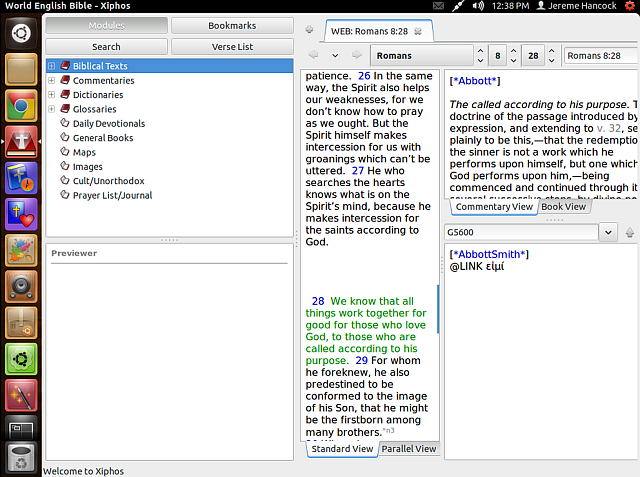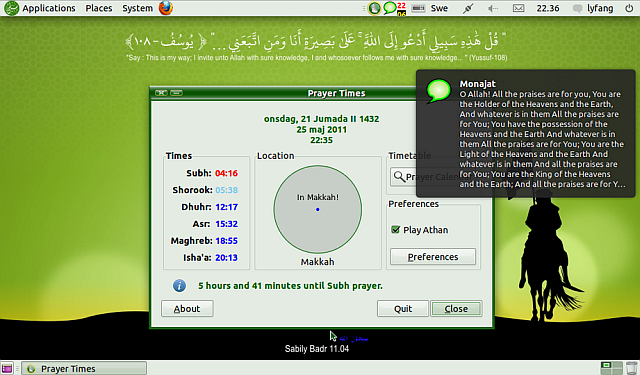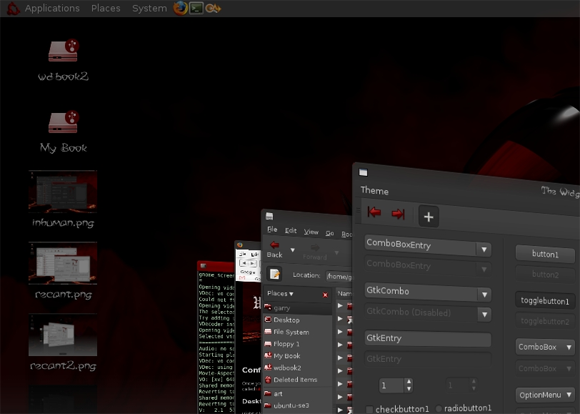Most of us are aware of the simply stunning range of Linux distros available at the click of a button. They are far reaching, numerous, and can be customised almost infinitely. It is this customisation that draws many people in: where the rigidity of Windows or a Mac stops your creative bent, a Linux distro can provide you the platform to explore your ideas.
Here we’re looking at a couple of religious Linux distros. The creativity and freedom of the Linux platform allows any developer to explore their own beliefs, whilst providing others with an operating system preloaded with the best religious observance tools Linux has to offer.
Ubuntuce
Ubuntuce, or the Ubuntu Christian Edition is a free, open-source Linux distro developed by Jereme Hancock and his tiny team, though Distrowatch.com currently lists the project as dormant. Ubuntuce isn’t a whole new distro, but has been repackaged with a smattering of useful Christian packages such as:
- Gnome Sword: A Bible study program for the Gnome Desktop, utilising The Sword Project
- e-Sword: Bible study program for Windows
- Xiphos: Bible study program written for Linux
- OpenLP: Religious presentation software for use in church. Bringing open-source software to your sermon.
- Quelea: Open-source church projection software with integrated sharing options for a host of other religious Linux packages.
- DansGuardian: Award winning open-source web content filter.
DansGuardian can be particularly useful, especially for parents that want to protect their children. It is flexible, so you can set it to ultra-conservative, restricting access to a massive range of sites, or just to skim off the worst of the worst bits of the Internet. It matches URLs, phrases and pictures to its blacklists, which are set to Primary School level by default. Either way, you’ll find it useful.
"The concept behind the Ubuntu Christian Edition is not to deviate from the Ubuntu community. It is intended to draw a larger Christian base to the already thriving community of Ubuntu users"
Despite this very positive attitude toward the existing Ubuntu and wider Linux community, the distro has still drawn criticism, and in some quarters, ridicule. The criticism levelled at Ubuntuce mainly stems from a belief that the distro should actually be a meta-package, if that is all the distro is: vanilla Ubuntu with Christian packages, styles and backgrounds preloaded. So for instance, a simple
sudo apt-get install UbuntuCE
could then be used to grab the meta-package, install, and voila – the same outcome.
Others have argued that religion should be left out of software, but I personally don’t have a problem with this, especially considering the broad Linux spectrum. Why shouldn’t there be a dedicated Christian distro, or for any other religion for that matter? Curating and developing a single Linux distro to ease the switch of users to the open-source operating system can only boost the community, whilst insulating users from the concepts of command lines and packages before they are ready to learn.
Bodhi Linux
Our second religious Linux distro is Bohdi Linux, or The Enlightened Linux Distribution, for the Buddhist’s amongst us. Unlike its Christian counterpart, Bohdi Linux is still very much under-development, receiving its last update as recently as February 17th. The distro comes in both 32 and 64 Bit flavours, and also has support for Chromebooks as well as other legacy devices.
Much like the religion itself, Bodhi Linux seeks to strike a balance between minimalism and functionality, with its default installation applications taking up no more than 10MB of space, including just:
- ePhoto: Image viewer package.
- Midori: Lightweight Internet browser.
- Terminology: Lightweight terminal.
This, in conjunction with The Enlightenment Desktop, delivers a fast, compact and flexible Linux distro that can be used as a solid base for further customisation, or just for a rapid install when needed. Furthermore, its lightweight philosophy make it perfect for aging machines, requiring only 128MB RAM and a 300Mhz processor to run – perhaps this is one to keep on your phone, or on your flash drive for a backup distro.
There is a significant difference in the development style of these distributions. However, both provide a solid, useful foundation for any newcomers to Linux operating systems, Ubuntuce full of protection and moderation, and Bodhi Linux with its customisable, lightweight designs.
R_Pi Bodhi Linux
Bodhi Linux is also available for RaspberryPi with instructions for installation and an image found here.
Other Religious Distros
There are more religious Linux distributions out there, but many haven’t been updated for years, such as Ubuntu Jewish Edition.
Others, such as the somewhat popular Ubuntu Muslim Edition (Sabily) haven’t been updated, but still have a niche user-base that value the work already completed by the developers. This distro also received criticism from the Muslim community, with users claiming it was "a silly imitation of the already criticised Christian Edition of Ubuntu."
There is also a sub-category of meta-packages that can be used to alter Linux, such as Kubuntu Satanic Edition. Designed in the wake of Ubuntuce’s release, the meta-packages adds a set of themes to Ubuntu featuring all manner of dark and Satanic imagery. It is silly, and a childish response to a serious project – but some people really like it.
Scrolling through the Internet illustrates that despite the power of religion, and the billions of religious individuals, there isn't a whole lot of support for religious Linux distributions. Perhaps people are right: don’t mix religion with software, because once it starts, where does it end?
Have you used a religious Linux distro? Do you think that each religion could have its own distro, or should we just focus on improving what’s already there? Are we all better together? Let us know below!
Image Credits: Xiphos via Ubuntuce.com, Sabily Linux via Wikimedia Commons





